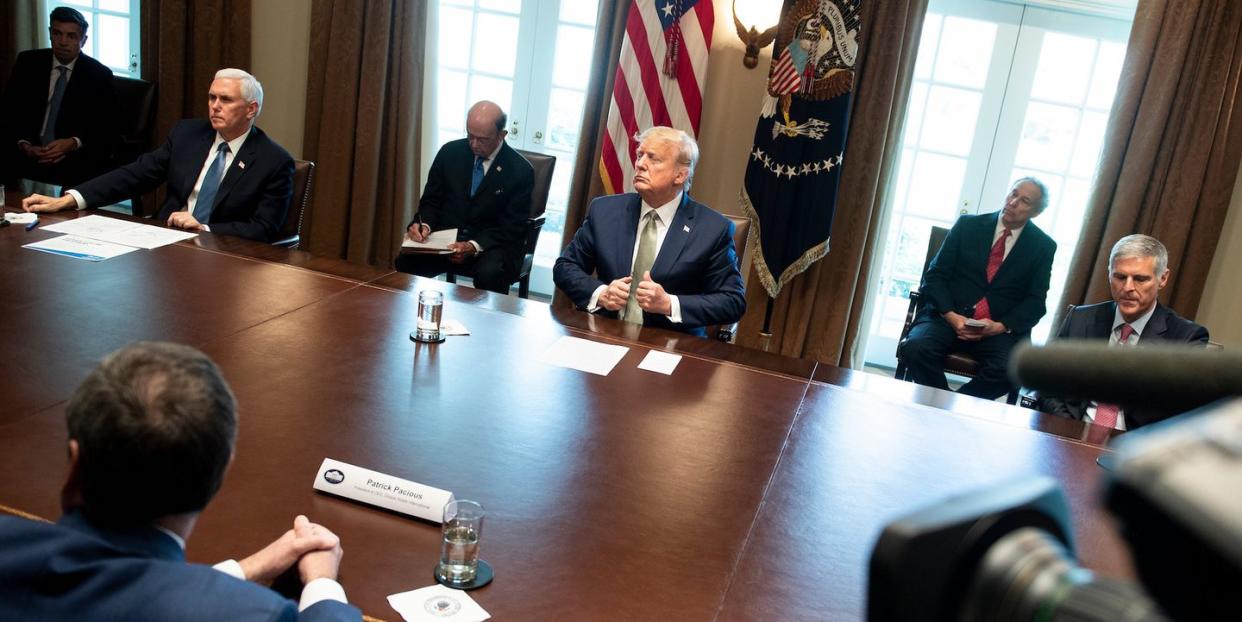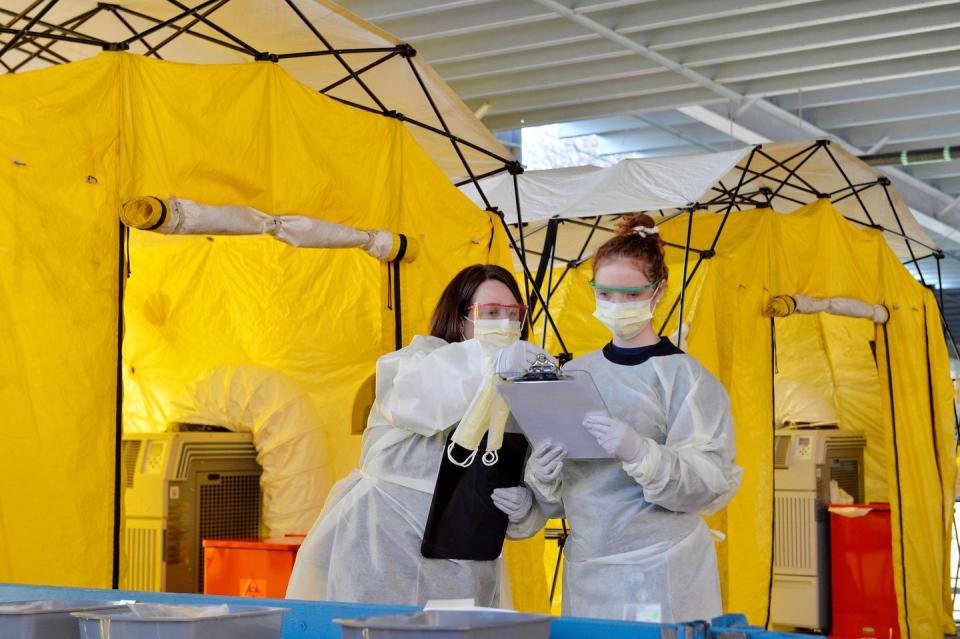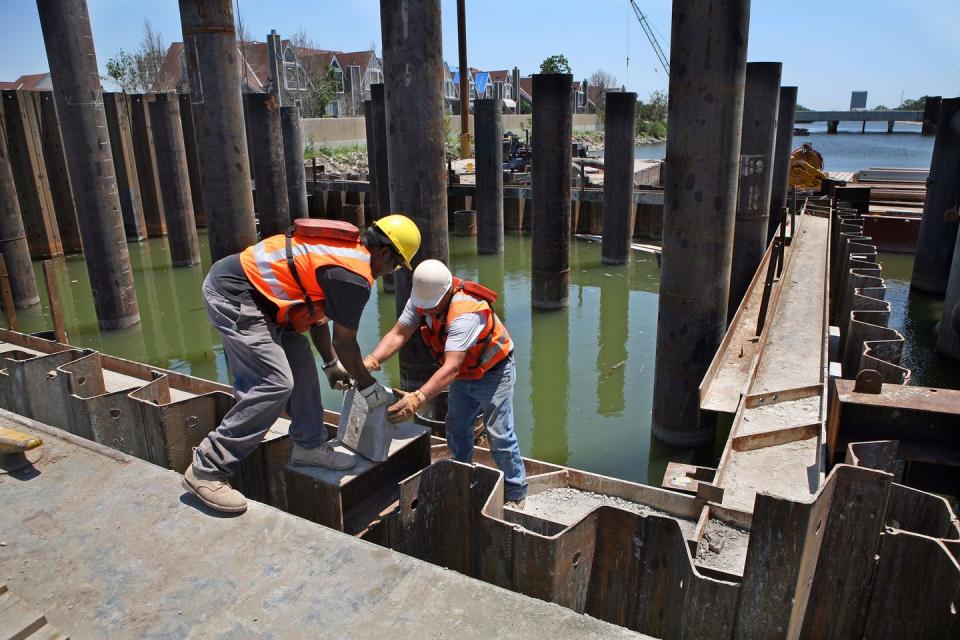We Need More Hospital Beds. The Army Is Ready. But Trump Still Hasn’t Made the Call.

Just one more time for the people in the back: it is not "politicizing" the coronavirus crisis to assess how well the president and his administration are responding to it. This is our basic duty as citizens of a self-governing republic. The president ran for the job on the basis he would represent our interests in government—including and especially in times of crisis—and now it's our job to hold him to that. After all, it's our health and safety on the line. The idea that making accurate and valid critiques of an American administration indicates you hate America is legitimately deranged, and people who push this line of thinking are telling on themselves. Or, as Teddy Roosevelt put it:
To announce that there must be no criticism of the President, or that we are to stand by the President, right or wrong, is not only unpatriotic and servile, but is morally treasonable to the American public.
OK, cool.
Now it's time to ask why the United States government has not gotten to work building out the nation's hospital capacity for the coming surge of patients, many of whom will require intensive care. A ProPublica report on a new study from the Harvard Global Health Institute finds that in most scenarios—even those where we "flatten the curve" significantly with social distancing—many regions will be overwhelmed by COVID-19 patients. In the best-case scenario, the infection rate will remain low at 20 percent of adults over 18—or 49.4 million people—and hospitals will be under serious strain.

It's more likely that the infection rate will be higher. In the study's "moderate" scenario, 40 percent of adults contract the coronavirus and a little more than one-fifth of those 99 million people will need to be hospitalized. To deal with that, the United States would need to double its available hospital beds. The worst-case scenario—60 percent infected in a six-month span—is just terrifying. We'd need seven times the number of beds we currently have, not to mention many times more ventilators and masks for healthcare workers and all the rest.
All this is to say that we need to dramatically ramp up our healthcare system's capacity. One way to do that would be to enlist the Army Corps of Engineers to start building out additional facilities, particularly in hotspot areas like New York. A New York Times report Tuesday was not encouraging in that regard.
[New York Governor Andrew Cuomo] wants the Army Corps of Engineers to help New York set up temporary hospitals — as he said he fears the state is about to face a disastrous shortage of hospital beds, particularly in intensive care units.
“They build airports,” he said. “They build the bridges. They build hospitals. This is exactly what they do.”
A spokeswoman at the Army Corps of Engineers said on Tuesday that the agency — which has had its massive capacity put to use in past disasters like Hurricane Katrina — was still awaiting orders.
“The U.S. Army Corps of Engineers is prepared to assist the nation in a time of crisis to the very best of its capabilities, and we are postured to lean forward when an official request is received through the Department of Defense,” Raini W. Brunson, an Army Corps spokeswoman said in a statement. “However, at this time, we have not been assigned a mission.”
How is this even a question? Why are we not building hospital capacity as fast as we can?

Why, as the Times report also outlines, have we not deployed any of the hospital ships at our disposal? Why is FEMA, which has unique capacity within the federal government to coordinate requests from states and action on the part of federal agencies, largely sitting on the sidelines? Why has the Department of Veterans Affairs and all of its hospital capacity gone largely untapped? Why is the National Disaster Medical System, a function of the Department of Health and Human Services, largely still awaiting orders?
The person who can order all of these actors into action is the President of the United States. The person who is responsible for the overall federal response is the President of the United States. Congress can pass a stimulus and send people money and guarantee paid sick leave and enact a moratorium on mortgage and rent payments—and they should do all of those things. But only one person exercises the full power of the Executive Branch, and so far he is failing in the task. The U.S. has completely failed on testing when compared to South Korea, which had its first case a day earlier than we did, or even Greece and the Czech Republic, which even this week were testing more people per capita than the U.S. The lack of testing has rendered any strategy of targeted quarantine and suppression impossible, which means the entire population must now practice social distancing, possibly for a year.
It is not unpatriotic or anti-American to say the American president is not doing his job well enough. Because it's the truth. And it will start to dawn on even some of his most enthusiastic fans when it all really hits the fan over the next week or two, just like it ought to dawn on loyal Democrats that their leadership's proposals have also been inadequate so far. In fact, the consistent pressure in recent weeks from independent sources of information in the Fourth Estate may well be the main reason we are not even further behind in our response. This is why the whole freedom-of-the-press thing ranked highly for the guys who wrote the Constitution. No matter what kind of gaslighting bullshit they're peddling today, the president and his propaganda network were downplaying the crisis a week ago, and this attitude was reflected in material terms in the federal government's response. We owe him nothing. He owes us everything. Act accordingly.
You Might Also Like

